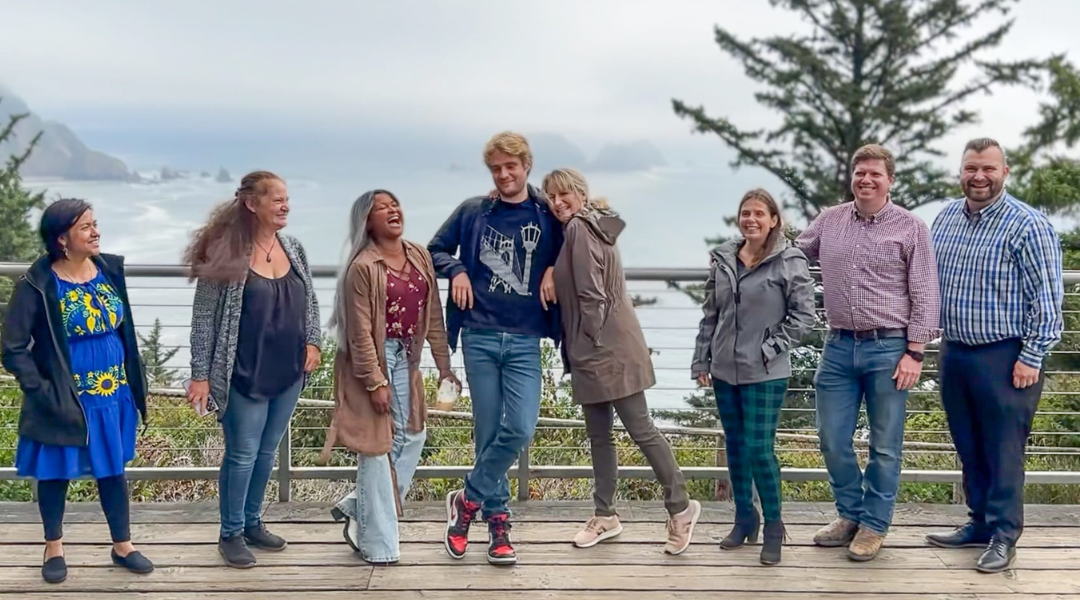
Cherryl Torkkola is front right and Penny Conner stands behind her.
For the past year, Ampact, with support from CoGenerate’s Generations Serving Together program, placed cogenerational pairs of AmeriCorps members in elementary schools. The older and younger adults worked side by side to improve students’ reading and math skills.
A new survey reveals big benefits both for the quality of tutoring and for the prospect of building bridges across generational divides. About 515 tutors were invited to respond to the survey; 355 did, a 68% response rate.
Here are the key findings:
- 61% of respondents said intergenerational service “made me a better tutor.”
- 48% of respondents said intergenerational service “made me better at establishing strong relationships with the students I tutor.”
- 71% of respondents said intergenerational service “increased my opportunities to interact meaningfully with people of a different generation.”
- 66% of respondents said intergenerational service “gave me opportunities to understand people of a different generation.”
- 59% of respondents said intergenerational service “helped me realize I can learn from people of a different generation.”
Tutoring pairs engaged in a lot of interactions over longer periods of time were even more positive, providing about a 10 percent bump in positive responses to the questions above.
“I’m so excited about the value of intergenerational service that this research reveals,” says David Parker, Ph.D., vice president of research and development at ServeMinnesota and the researcher behind the study. “Society tends to kind of silo us and put us in contact with those who are at a similar stage of life or background, and it’s neat to see that service alone is offering exposure and opportunities to engage across generational lines.”
At a recent virtual event CoGenerate hosted with Ampact (watch the recording here), one cogenerational pair of tutors helped bring the data to life.
Penny Conner, 24, is in her second year as a math tutor at an elementary school in Minnesota. She was paired with Cherryl Torkkola, 56, a reading tutor working with K-3 students at the same school. A former educator, Torkkola says Conner was instrumental in helping her get up to speed during her first few weeks.
“Penny was my go-to person during that time,” she says, “especially when it came to using the technology.” She continues, “But because of my background in education, I was able to help Penny and some of the other younger Reading Corps members in the classroom.”
Because she’s closer in age to the students, Conner says that she naturally shares a lot of their interests. “I’m big into Pokemon and anime and can connect with them on that level,” she says. “But Cherryl is more professional and I really admire that. Like, when we have half-days once a month, she proactively goes around to all the teachers and figures out how we can still find time to pull the students in for tutoring.”
The two have also been able to connect on a more personal level, with Torkkola consulting with Conner about topics she’s considering discussing with her adult children and getting valuable feedback. “I have adult children the same age as Penny and she has helped me relate to my own children better, which I’m eternally grateful for,” she says.
Conner appreciates these interactions, too, reflecting that it feels particularly good to help Torkkola improve her relationship with her children because she is estranged from her own parents. “I still get that interaction with a motherly age group in Cherryl,” Conner adds, “and that’s so special.”
One survey respondent added this comment to the end of the survey: “My intergenerational experience as an AmeriCorps member has challenged my assumptions, broadened my horizons, and deepened my appreciation for people from different generations. It has enriched my understanding of the human experience and strengthened my commitment to building bridges and fostering intergenerational connections.”
Ampact is a nonprofit organization that runs programs in 16 states and served more than 50,000 students last year.
Learn more about Ampact and read our Q&A with Dr. Shawonna Coleman, executive director of the Georgia Reading and Math Corps and a Generations Serving Together grantee.





